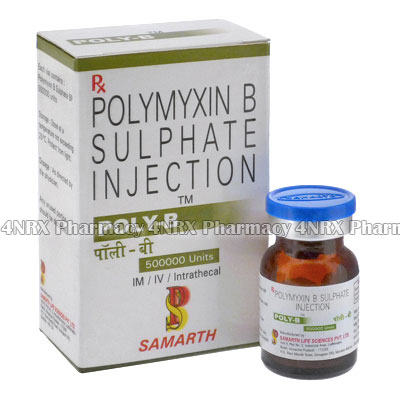 |
Home  Infection Infection  POLY-B Injection (Polymyxin B Sulphate) POLY-B Injection (Polymyxin B Sulphate) |
|
|||||||||
|
|
POLY-B Injection (Polymyxin B Sulphate)
What is POLY-B Injection (Polymyxin B Sulphate) used for? Polymyxin B sulfate is an antibiotic that can help treat infections of the urinary tract, meninges, and bloodstream that are the result of susceptible strains of Ps. aeruginosa. Poly-B is a vial of Polymyxin B Sulphate suspensions that can be diluted for injection or use topically to treat eye infections caused by susceptible strains of Ps. aeruginosa. How should I use POLY-B Injection (Polymyxin B Sulphate)? Poly-B is packaged as a suspension in a vial. Each vial contains 500,000 units of Polymyxin B Sulphate. Poly-B must be diluted in a suitable solution prior to administration. For Intravenous Injection: One vial should be dissolved in 300 to 500 mL of solution for parenteral dextrose injection 5% for continuous drip. A dosage of 15,000 to 25,000 units/kg body weight/day is usually given to adults with no kidney problems. A lower dosage should be given to adults with kidney impairment or to children or infants. For Intramuscular Injection: Dissolve one Poly-B vial in 2 mL sterile water for injection or sodium chloride injection or procaine hydrochloride injection 1%. A dosage of 25,000 to 30,000 units/kg/day should be given to healthy adults. Children and patients with renal problems require a lower dosage. For Intrathecal Injection: Dissolve one vial of Poly-B in 10 mL sodium chloride injection USP. A dosage of 50,000 units once daily is given for 3 to 4 days. This is then reduced to 50,000 units once every second day for at least 2 weeks after cultures of the cerebrospinal fluid are negative and sugar content has returned to normal. For Opthalmic Administration: Dissolve one Poly-B vial in 20 to 50 mL sterile water for injection or sodium chloride injection USP. Drops should be applied 1 to 3 times per hour. What are the side effects of POLY-B Injection (Polymyxin B Sulphate)? Polymyxin B Sulphate has been associated with a potentially fatal side effect known as Clostridium difficile associated diarrhea (CDAD) or Antibiotic-Associated Diarrhea (AAD). Changes in intestinal flora resulting from antibiotic use can lead to anything from mild diarrhea to fatal colitis. Contact your doctor immediately if you experience diarrhea while taking Poly-B injection. Other side effects associated with Polymyxin B Sulphate include
Please Note Poly-B should be used with caution and at an adjusted dosage in patients with impaired renal function. Have your doctor measure your renal function prior to use. Poly-B must only be administered via intramuscular injection or intrathecal injection to hospitalized patients under medical supervision. Polymyxin B Sulphate is contraindicated in patients who are taking any neurotoxic or nephrotoxic drugs including bacitracic, neomycin, streptimycin, kanamycin, tobramycin, gentamycin, amikacin, cephaloridine, paromomycin, colistin and viomycin. 
|
||||||||||||||||||||||